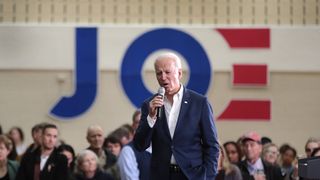By a large margin, Australians prefer Democratic candidate Joe Biden to Donald Trump as the next US president.
In surveys of more than 1820 respondents fielded in July 2019, and another 1619 earlier this month as part of the United States Studies Centre’s State of the United States poll, we asked Australians which candidate they wanted to win the November presidential election.
Over the past year support for Trump’s re-election increased slightly from 20 per cent to 23 per cent among Australians. Australian support for the Democratic candidate, Joe Biden, now stands at 49 per cent of respondents, up from 41 per cent a year ago. Notably, 13 per cent of Australians want someone other than Trump or Biden to become president, and 15 per cent have no preference.
Over the past year support for Trump’s re-election increased slightly from 20 per cent to 23 per cent among Australians. Australian support for the Democratic candidate, Joe Biden, now stands at 49 per cent of respondents, up from 41 per cent a year ago.
Across almost all segments of Australians, support for Biden handily exceeds support for Trump’s re-election. In our October 2020 survey, 41 per cent of Coalition voters preferred a Biden win, compared with 31 per cent who would rather see a second term for Trump. Among Labor supporters, support for Biden and Trump was 64 and 13 per cent respectively, a 51-point margin.
As in the US, we see a sizeable gender gap in preferences for Biden or Trump. Australian men are almost twice likely as women to support Trump, at 30 per cent compared with 17 per cent. However, both still prefer Biden to Trump with 52 per cent of women and 45 per cent of men. There is little variation by age, but Australian support for Trump is lowest among younger and older groups.
Trump’s re-election outpaces support for Biden among Australian minor-party supporters and non-voters, 34 to 26 per cent, the only segment of the Australia population we found where Trump was preferred to Biden.
While Australians clearly favour Biden, Australian preferences over the 2020 US presidential candidates are not as lopsided as in other recent US elections.
While Australians clearly favour Biden, Australian preferences over the 2020 US presidential candidates are not as lopsided as in other recent US elections.
Ahead of the 2008 presidential election, we found 60 per cent of Australians said they would vote for Barack Obama (if they could), with just 14 per cent supporting Republican candidate John McCain. Trump’s support among Australians in 2016 (23 per cent) exceeded McCain’s by nine points. At the same time, Biden is not winning hearts and minds in Australia as Obama did in 2008, with Biden’s 49 per cent support from Australians significantly lagging Obama’s 60 per cent. More than 80 per cent of Australians under 40 years of age preferred Obama to McCain in 2008; younger Australians prefer Biden to Trump, but not with the overwhelming levels of support observed for Obama in 2008, another echo of patterns of support and enthusiasm we observe in the US.
Does this matter?
Popularity and approval ratings are important assets for an American president at home. But presidential popularity, and its political power, does not stop at the water’s edge. Outside the US it can be an important lever of American statecraft and alliance management.
State of the United States poll: Australians' preference for Trump grows, but preference for Biden grows more

The government-to-government elements of the Australia-US relationship are as strong as ever, partially due to a shared understanding Australia is on the front lines with an ever more assertive and capable China. But Australian public opinion about the US — about American power and prestige — waned during the Trump presidency.
The US-Australia relationship has reasonably robust bipartisan support and deep institutional foundations, but also throughout the economy and civil society. This scaffolding helps insulate Australian political leaders from the domestic political costs of dealing with a US led by a relatively unpopular president.
Tensions with China have provided a helpful offset, reminding Australians of the importance of our security relationship with the US, irrespective of presidential popularity.
But there are limits. Four more years of Trump will test the robustness of the bipartisan support for the Australian-US relationship, even as the US alliance remains paramount to Australian national security.
A Biden term will also present challenges, but for different reasons. If he wins, Biden will be a reassuring figure to the Australian public and many in Canberra, who will welcome a restoration of convention in alliance management and less hostility to multilateral forums. But will Biden value the US-Australia relationship as much as Trump, or does his administration dilute its focus on the Indo-Pacific?
The irony could be that like Obama, Biden is a relatively popular president, but disappoints the strategic affairs community if US strategic ambitions for the Indo-Pacific are not fully realised.







